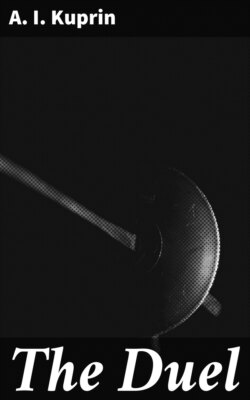Читать книгу The Duel - А. И. Куприн - Страница 6
На сайте Литреса книга снята с продажи.
ОглавлениеMy dear darling irresistible little Georgi (read Romashov in the sloping, crooked lines he knew so well),—For a whole week you have not been to see me, and yesterday I was so miserable without you that I lay and wept the whole night. Remember that if you fool me or deceive me I shall not survive it. One single drop of poison and I shall be freed from my tortures for ever; but, as for you, conscience shall gnaw you for ever and ever. You must—must come to me to-night at half-past seven. He is not at home, he is somewhere—on tactical duty or whatever it is called. Do come! I kiss you a thousand thousand times.
Yours always,
Raisa.
P.S.—
Have you forgotten the river fast rushing,
Under the willow-boughs wending its way,
Kisses you gave me, dear, burning and crushing,
When in your strong arms I tremblingly lay?
P.SS.—You must absolutely attend the soirée next Saturday at the officers’ mess. I will give you the third quadrille. You understand.
A long way down on the fourth page lay written—
I have kissed
here.
This delightful epistle wafted the familiar perfume of Persian lilac, and drops of that essence had, here and there, left yellow stains behind them on the letter, in which the characters had run apart in different directions. This stale scent, combined with the tasteless, absurdly sentimental tone throughout this letter from a little, immoral, red-haired woman, excited in Romashov an intolerable feeling of disgust. With a sort of grim delight he first tore the letter into two parts, laid them carefully together, tore them up again, laid the bits of paper once more together, and tore them again into little bits till his fingers got numb, and then, with clenched teeth and a broad, cynical grin, threw the fragments under his writing-table. At the same time, according to his old habit, he had time to think of himself in the third person—
“And he burst out into a bitter, contemptuous laugh.”
A moment later he realized that he would have to go that evening to the Nikoläievs’. “But this is the last time.” After he had tried to deceive himself by these words, he felt for once happy and calm.
“Hainán, my clothes.”
He made his toilet hastily and impatiently, put on his elegant new tunic, and sprinkled a few drops of eau-de-Cologne on a clean handkerchief; but when he was dressed, and ready to go, he was stopped suddenly by Hainán.
“Your Honour,” said the Circassian, in an unusually meek and supplicating tone, as he began to execute a most curious sort of dance before his master. Whilst he was performing a kind of “march on the spot” he lifted his knees right up, one after the other, rocking his shoulders, nodding his head, and making a series of convulsive movements in the air with his arms and fingers. Hainán was in the habit of giving vent to his excited feelings by curious gestures of that sort.
“What do you want now?”
“Your Honour,” stammered Hainán, “I want to ask you something; please give me the white gentleman.”
“The white gentleman? What white gentleman?”
“The one you ordered me to throw away—the one standing in that corner.”
Hainán pointed with his fingers to the stove-corner, where a bust of Pushkin was standing on the floor. This bust, which Romashov had obtained from a wandering pedlar, really did not represent the famous poet, but merely reproduced the forbidding features of an old Jew broker. Badly modelled, so covered with dust and fly dirt as to be unrecognizable, the stone image aroused Romashov’s aversion to such an extent that he had at last made up his mind to order Hainán to throw it into the yard.
“What do you want with it?” asked Romashov, laughing. “But take it by all means, take it, I am only too pleased. I don’t want it, only I should like to know what you are going to do with it.”
Hainán smiled and changed from one foot to the other.
“Well, take him, then; I wish you joy of it. By the way, do you know who it is?”
Hainán smiled in an embarrassed way, and infused still more energy into his caperings.
“No—don’t know.” Hainán rubbed his lips with his coat sleeve.
“So you don’t know. Well, listen. This is Pushkin—Alexander Sergievich Pushkin. Did you understand me? Now repeat—‘Alexander Sergievich——’”
“Besiäev,” repeated Hainán in a determined tone.
“Besiäev? Well, call him Besiäev if you like. Now I am off. Should any message come from Mr. and Mrs. Peterson, say I’m not at home, and you don’t know where I have gone. Do you understand? But if any one wants me in the way of business connected with the regiment, run down at once for me at Lieutenant Nikoläiev’s. You may fetch my supper from the mess and eat it yourself. Good-bye, old fellow.”
Romashov gave his servant a friendly smack on his shoulder, which was answered by a broad, happy, familiar smile.
